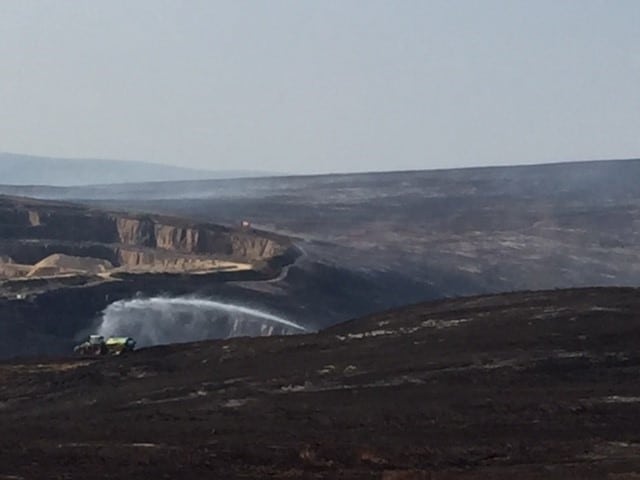The founder of EnviroSAR, whose expertise was used to learn more about two wildfires that devastated vast moorland areas this summer in the northwest of England, is aiming to expand further the research and development of her company to better monitor wildfires and the moorland restoration at a national level.
Dr Gail Millin-Chalabi launched EnviroSAR – a targeted solution for peat moorland and heathland restoration in the UK – last year and recently appeared on BBC’s The One Show and BBC Breakfast to discuss the company’s involvement in tackling the Tameside and Winter Hill wildfires.
EnviroSAR, funded by the University of Manchester’s Innovation Company, UMI3 Ltd, analyses satellite radar data to mitigate wildfire risks, supports planning and execution of land restoration activities to reduce water discolouration and associated costs.
EnviroSAR has previously collaborated with fire services and is looking to build stronger relationships with both utility and insurance companies to support wildfire recovery and restoration efforts.
Dr Millin-Chalabi said the moorland wildfires this summer has highlighted the need for further funding to support research and development work in this area. EnviroSAR are currently exploring opportunities for European Space Agency (ESA) funding to expand the business.
The original idea for EnviroSAR came out of Dr Millin-Chalabi’s PhD back in spring of 2016.
“I’d been using radar data for characterising and monitoring burnt areas after wildfires,” said Dr Millin-Chalabi, who is a GIS and Remote Sensing Officer in the School of Environment, Education and Development at The University of Manchester.
“Not long after coming up with the idea of EnviroSAR we won the European Copernicus Masters Sustainable Living Challenge and are receiving support from UMI3 through the UMIP Innovation Optimiser Programme which empowers innovators from across the University to create start-up businesses.”
Dr Millin-Chalabi said there’s a whole education programme needed when it comes to UK moorland fires.
“If we keep getting these very dry conditions there is more risk of wildfires unfortunately as large amounts of moorland and heathland areas in the UK are degraded and not particularly healthy.
“This year we are seeing a much longer wildfire season in the UK. Usually we are over them by mid-May. Some are still burning and it’s July.
“If we keep experiencing these drier and hotter weather conditions year after year, our wildfire season could start transitioning into the summer, more like, dare I say it, Mediterranean areas and expanding into the months of June and July.”
On what can be done to understand patterns of wildfire occurrence and mitigate against wildfire risks she said: “Nationally things need to be more integrated when it comes to what is collected on the ground and what is available through satellite data.
“Information has to be shared and managed well and marry together better, rather than piece-meal which it seems to be at the moment. EnviroSAR could really help with that.”
She added: “A healthy moorland environment should have a high water table and plants such as sphagnum moss, which holds around 20 times its own weight in water. It’s like a sponge. When you have these kinds of plants, even if a wildfire happens it slows the burn down as the landscape is more resilient and so the burn will be less severe.
“We also need to connect more socially with local communities in moorland areas.”
Utility and insurance companies are vital when it comes to wildfires, according to Dr Millin-Chalabi: “No matter how much hosing down or how many helicopters drop water on an area affected by wildfire, it’s not going to go out until mother nature intervenes with a heavy downpour due to the highly organic nature of the underlying peat.
“We are keen to start building stronger relationships with utility and insurance companies as once we get a heavy downpour of rain all that ash and char on the surface is going to potentially run into our watercourse and cause discolouration and sedimentation issues of our drinking water.
“The north west of England is a post-industrial revolution area so there is also potential for heavy metals in some of these peaty soils to erode into the wider environment if restoration of the peat moorland does not take place.
“EnviroSAR is keen to assist utility companies in where is best to target restoration efforts using satellite technology to try and mitigate downstream environmental issues as much as possible.”





